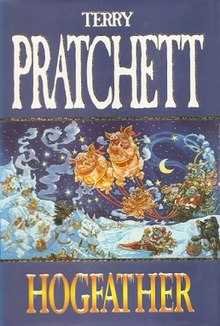Hogfather
 | |
| Author | Terry Pratchett |
|---|---|
| Language | English |
| Series | Discworld 20th novel – 4th Death story |
| Subject | Christmas, children's stories, the power of belief
|
| Genre | Fantasy |
| Publisher | Victor Gollancz |
Publication date | 1996 |
| Awards | Came 137th in the Big Read |
| ISBN | 0-575-06403-X |
Hogfather is the 20th Discworld novel by Terry Pratchett, and a 1997 British Fantasy Award nominee.[1] It was first released in 1996 and published by Victor Gollancz. It came in 137th place in The Big Read, a BBC survey of the most loved British books of all time, making it one of fifteen books by Pratchett in the Top 200.[2]
The book focuses on the absence of the Hogfather, a mythical creature akin to Father Christmas, who grants children's wishes on Hogswatchnight (December 32) and brings them presents. While Death attempts to fill in for the Hogfather, his granddaughter Susan Sto Helit tries to find and rescue the Hogfather.
Plot summary
The Auditors of Reality, a group of "celestial bureaucrats" attempt to eliminate the Hogfather, a jolly god-like creature who grants children's wishes on Hogswatchnight (December 32) and brings them presents which in their view creates chaos in the universe. Forbidden to interfere directly, they pay the Assassin's Guild to kill the Hogfather instead. The task is given to Mr. Teatime who has a reputation for ruthlessness and creative solutions. Mr. Teatime enlists the help of some gangsters to find a delivery person working for the Tooth Fairy, using his magic to break into her kingdom and stealing all the collected teeth. With these teeth, he is able to control all the children on the Discworld, commanding them to no longer believe in the Hogfather.
Knowing that the Hogfather is also responsible for the sun rising which people have forgotten, Death attempts to maintain belief in the Hogfather by dressing up and fulfilling his role. Since he is also unable to defeat Mr. Teatime who resides in a realm created by children's belief where death (and thus Death) does not exist, he appears at his granddaughter's place of work dressed as the Hogfather. As he planned, Susan Sto Helit is unable to resist her curiosity and tries to find the Hogfather. She visits the Hogfather's Castle of Bones, only to find the hung-over Bilious, the "Oh God" of Hangovers. In an attempt to cure Bilious from his hangorvers, Susan visits the Unseen University, where it is discovered that several small gods and beings (including Bilious) are being created due to an abundance of belief in the world caused by the Hogfather's disappearance.
Susan and Bilious travel to the Tooth Fairy's realm and discover Mr. Teatime's plot in her tower. Mr. Teatime attacks Susan using Death's sword but since it does not work in this realm, Susan is able to overpower him and throw him off the tower, causing him to disappear. She then manages to rescue the Hogfather who has reverted to his former self as a hog from Auditors who hound him in the form of attack dogs. Returning to her place of work, Death explains what happened to Susan but she is attacked by Teatime whom she finally manages to kill using the kitchen poker.
TV adaptation
A two-part TV film version of Hogfather was screened on 17 and 18 December 2006 on Sky One in the UK, with Ian Richardson as the voice of Death and David Jason playing Death's manservant Albert. Marc Warren played Mr. Teatime, Michelle Dockery played Susan Sto Helit, Rhodri Meilir played Bilious, and Tony Robinson (who narrated several audiobook versions of the Discworld novels) played the shop keeper Vernon Crumley. Terry Pratchett himself had a brief cameo as the toy-maker.
The US debut was on 25 November 2007 on ION Television, the Australian on 23 and 24 December 2007 on Channel Seven, and the German on 25 December 2007 on ProSieben.
Reception
The novel entered the UK Top 10 charts at #1 as hardback in October 1996[3] and as paperback in November 1997.[4] According to Publishers Weekly, Pratchett used a darker than usual tone as well as edgier satire for Hogfather than usually and concludes that he has now moved beyond the realm of humorous fantasy and should be recognized instead as "one of the more significant contemporary English-language satirists".[5]
References
- ^ "1997 Award Winners & Nominees". Worlds Without End. Retrieved 28 September 2009.
- ^ "BBC - The Big Read - Top 200 Books". www.bbc.co.uk. Retrieved 30 August 2018.
- ^ "Top 10 UK Hardbacks". The Guardian. 31 October 1996. Retrieved 30 August 2018 – via Newspapers.com.
- ^ "Top 10 UK paperbacks". The Guardian. 6 November 1997. Retrieved 30 August 2018 – via Newspapers.com.
- ^ "Fiction Book Review: Hogfather by Terry Pratchett". Publishers Weekly. 2 November 1998. Retrieved 30 August 2018.
External links
- Hogfather title listing at the Internet Speculative Fiction Database
- Annotations for Hogfather
- Quotes from Hogfather
- Synopsis of Hogfather
- Hogfather at Worlds Without End
